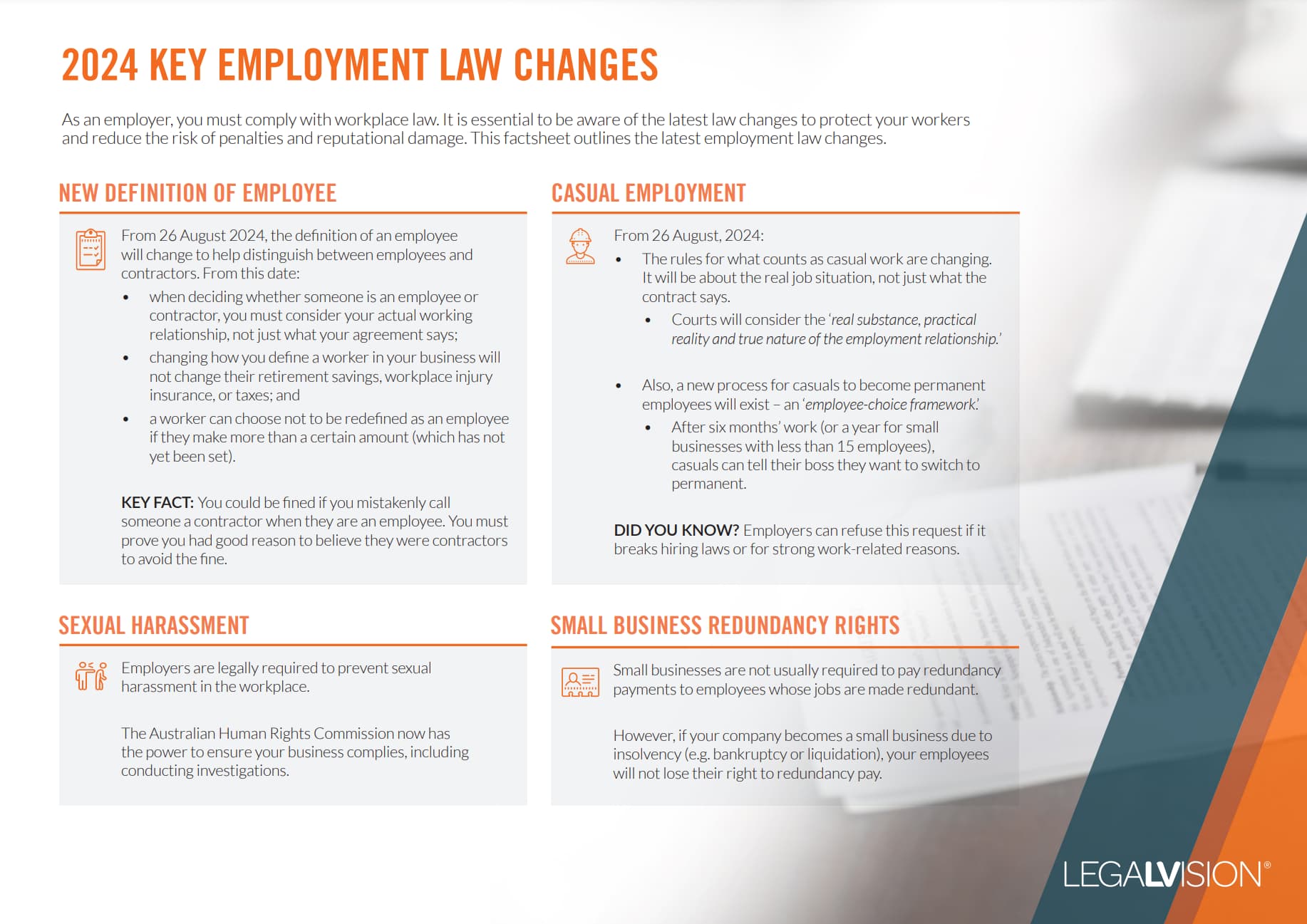As an employer, you need to know what minimum entitlements you owe your employees. The various modern awards, the National Employment Standards (NES) and the Fair Work Act 2009 (Cth) work together to dictate the rights and obligations of both employees and employers in the workplace. Specifically, awards will cover the minimum conditions of employment and pay rates for your employees. This article will explain how to determine whether your employees are covered by a modern award.
What is a Modern Award?
An award is an industrial instrument that outlines minimum terms and conditions of employment for any applicable employees. Importantly, an award cannot undercut any of your employee’s minimum entitlements under the NES.
Your business may be covered under an award for the industry that you operate in. If there is no relevant award that covers your industry or includes appropriate classifications for your employee’s role, your employee may be covered by an award on an occupational basis.
Determining which award, if any, applies to your employees is often not a straightforward task. Therefore, you may consider seeking legal assistance with determining what award to use.
What Steps Can I Take to Determine Which Award to Use?
You should consider the following points to determine which award, if any, covers your employees.
Continue reading this article below the form1. Industry
You should review the ‘coverage’ clause in the award to determine whether it covers your business. This clause usually lists the industry to which the award applies. You should then look at the ‘definitions and interpretations’ clause to see how the award defines that industry.
For example, the Hair and Beauty Industry Award covers employees throughout Australia in the hair and beauty industry. The award defines this industry as including the following:
- hair cutting, styling and dying;
- makeup;
- manicures and pedicures;
- lash and brow tinting; and
- facial and other body treatments.
If your business provides the above services, this award may apply to your employees.
The ‘coverage’ clause in an award may also exclude certain employees, including those covered by:
- enterprise agreements; or
- more than one award, where the other is more appropriate to their role and type of work.
2. Job Classification
Once you have considered whether the award covers the industry your business operates in, you should also look at the ‘classification’ clause in the potential award. This section will help determine whether your employees fall within the specific job classifications that the award covers.
For example, some of the classifications in the Hair and Beauty Industry Award include:
- hairdressers;
- beauty therapists;
- makeup artists;
- nail technicians; and
- cosmetologists.
Each of these classifications has different training and qualification requirements, such as certificates or diplomas. For example, a ‘Hair and Beauty Employee Level 5’ refers to a:
- hairdresser who holds a Certificate IV or equivalent; or
- a trichologist who is a hairdresser and holds a Certificate IV in Trichology or equivalent.
If your employees fit into the job classification contained in the award, the award will likely apply to them.
3. Occupation
If your employees are not covered by the industry award that covers your business, you may need to consider whether there is an occupation award that may cover your employee.
For example, the Hair and Beauty Industry Award is an award that covers employees working in the hair and beauty sector in Australia. Contrastingly, the Clerks Private Sector Award is an occupation award that covers employees engaged wholly or principally in clerical work, including administrative duties of a clerical nature.
You should then review any occupation awards and determine whether your employee would fit into them.
4. Exclusions
In addition to providing definitions for who is included in the award, awards also often exclude employees from certain jobs and industries. If your employees appear to be excluded by one award, you may need to look to other awards to find a more suitable fit.

As an employer, it is essential to understand what employment laws have changed and their implications for your business — particularly the changes to the Fair Work Act 2009 through the new Closing the Loopholes legislation.
What if My Employee Is Not Covered by an Award?
It is possible that your employee is not covered by an award. Most executive employees are generally not covered by an award based on the seniority of their role and their remuneration. In this case, the employee will be considered “award-free”. Award-free employees are entitled to the national minimum wage, which is currently $23.23 per hour, and other entitlements in line with the NES.
Key Takeaways
Awards will cover your employees if they work in an industry and job classification stated in the award. The requirements for an award to cover an employee include that the employee must:
- work in an industry the award covers;
- work in a position the award covers; and
- not belong to a position or industry explicitly excluded from the award.
It is also possible for your employee to be covered by an occupation award or not covered by any award. If you need assistance understanding what award applies to your employees, our experienced employment lawyers can assist as part of our LegalVision membership. For a low monthly fee, you will have unlimited access to lawyers to answer your questions and draft and review your documents. Call us today on 1300 544 755 or visit our membership page.
We appreciate your feedback – your submission has been successfully received.











